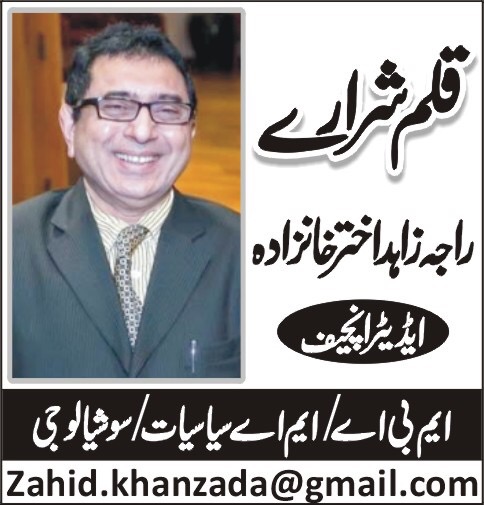Response Column: A Factory of Magic or a Mirror of Reality?
By: Raja Zahid Akhtar Khanzada
The complex and mythical landscape of Pakistani politics serves as fertile ground for the witty and satirical writings of seasoned columnist Sohail Warraich. His recent column “Yeh Sab Jadoo Ka Karkhana Hai” (This Is All a Magic Factory) creatively intertwined themes of mysticism, magic, and political narratives in such a way that the lines between reality and fiction blurred.
This satirical masterpiece cleverly frames Pakistan’s political struggles in the context of a mythical tale. However, in response, Dr. Shahbaz Gill’s counter-letter “Journalistic Hemorrhoids” fell short of understanding the depth of Warraich’s literary satire and devolved into personal attacks, missing a golden opportunity for a meaningful journalistic debate. The language and tone adopted were not only regrettable but also diminished the quality of political and journalistic discourse.
Warraich’s column is a creative critique of current political dynamics through metaphors of mysticism and magical narratives. His intent was to present the government, opposition, and political leaders’ narratives in a literary framework. Terms like “Donkey King” and “Malakh” serve as satirical metaphors already familiar in Pakistan’s political discourse, particularly regarding the Pakistan Tehreek-e-Insaf (PTI).
Unfortunately, PTI leader Dr. Shahbaz Gill responded with a letter filled with personal attacks and inappropriate language. He not only hurled baseless accusations at Warraich, a senior journalist, but also targeted his character and professional competence—behavior utterly unworthy of any serious political debate.
Warraich’s article reflects on Pakistan’s current political environment. He highlighted the influence of mysticism and magical beliefs in PTI’s politics—issues that have surfaced repeatedly in government policies and public perceptions. Bushra Bibi’s spiritual beliefs and alleged audio leaks have long been the subject of public discourse. Warraich presented these incidents through a satirical lens, using references to spirits, jinns, and mystical wars as metaphors for power struggles and political maneuvering. He crafted a realistic yet imaginative tale through symbols like Donkey King and Queen, aimed at awakening public consciousness.
Dr. Shahbaz Gill’s assertion that Warraich attacked Bushra Bibi’s “honor” is plainly incorrect. Nowhere did Warraich name her or write anything personally degrading toward her. His references cast her as a mythical political character, something he often employs in his writings.
Regrettably, Shahbaz Gill misinterpreted Warraich’s creative writing as a personal attack and responded by labeling his satire as “Journalistic Hemorrhoids”. His tone was fueled by anger and aggression, unbecoming of a serious political figure and party leader.
Gill further accused Warraich of being a “courtier journalist,” making the matter personal, while Warraich’s column broadly addressed PTI’s erratic political narratives and mystical folklore. Thus, Gill’s letter turned into a defensive rant that missed the original subject entirely.
If the respect for women in political discourse is indeed a concern, we should reflect on past personal attacks made by opposition leaders during political rallies. Targeting women in political satire is undoubtedly regrettable, but Warraich committed no such act.
Political satire is a respected journalistic genre that presents serious issues in a relatable and engaging manner. Through his column, Warraich masterfully illuminated the realities of Pakistani politics. Political leaders like Shahbaz Gill should understand that satire and criticism in democratic societies are tools for introspection, not enemies.
Globally, political satire has been a crucial element of literary creativity. Politicians frequently face satire and cartoons—it is an essential component of democracy. Attacking journalists or resorting to insults neither strengthens politics nor addresses public issues.
Warraich’s writing reflects his vast experience and literary brilliance, unveiling the truths of Pakistani politics while prompting readers to reflect. In contrast, Shahbaz Gill’s response amounted to little more than an emotional, hollow defense. Political leaders should face criticism with patience, logic, and civility, setting a positive example for the public, as journalism’s job is to uncover the truth, be it in a Magic Factory or the corridors of power.
Sohail Warraich had previously written a similar satirical piece about former Prime Minister Nawaz Sharif’s wife and his father, Mian Sharif. Since it targeted PTI’s opposition, not a single PTI leader criticized that article. However, when it was their turn to be criticized, they exploded in anger, branding the same journalist, once considered credible, a “courtier.”
Responding to political satire with uncivil language and personal attacks further poisons Pakistan’s political and journalistic environment. Differences of opinion should not translate into personal enmity. Political leaders like Dr. Shahbaz Gill should respond to criticism with tolerance, logic, and civility, offering a better example for the public.
Warraich’s column should not be dismissed as merely a fictional story. His writing explores the complex relationships between power, loyalty, and human emotions, acknowledging that no relationship lasts forever, and every pleasant moment is temporary. It is not just a story—it is a life lesson we all must endure.
Warraich’s writing is a blend of realism and literary beauty. His words serve as a mirror, reflecting our successes, failures, joys, and sorrows. His unique style compels readers to ponder the deeper aspects of love, relationships, and life itself.



